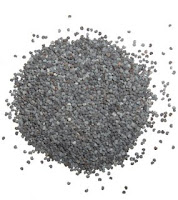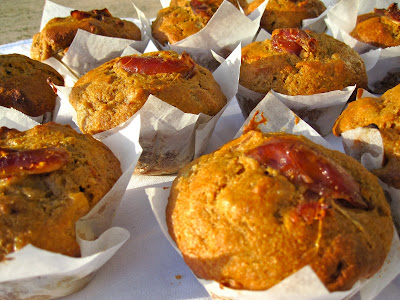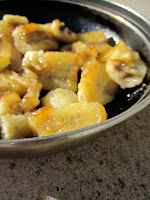
The Autumnal Ides of March have come and gone and left drizzly cold weather in their wake. The mornings are brisk, the afternoons wet and the nights increasingly long. As tans emerge from cans, follies are spoiled by brollies and Chartreuse takes over from juice, it's the ultimate time to invoke that muffin merriment!
With weather reminiscent of the Austrian Alps, we naturally need a muffin to match. This recipe takes inspiration from the Austro-Hungarian "Linzer Torte" - a wholesome winter cake made from crushed hazelnuts. The genuine article is a Slavic home-maker's dream - a lardy, lattice work spectacular, complete with bright pink raspberry jam. It's the kind of peasant fare that just screams, "hessian is the new black."
Here we give the Linzer Torte a twenty first century make-over! We take it from the realm of dessert into the realm of breakfast, adding sweet winter pears, good quality dark chocolate and Linseed, Sunflower seed and Almond Meal mixture (commonly known as LSA - yes, it sounds like a hallucinogen but it's better). Hazelnuts remain essential but, since Hazelnut meal is both expensive and hard to source, we'll only use them as crunch.
Health Benefits:
 LSA is a specially formulated combination of linseed (flaxseed), sunflower seed and almond which is ground into a meal. It's a great source of omega 3, 6 and 9 essential fatty acids, protein, dietary fibre, Vitamin E (Alpha Tocopherol), Thiamin, Magnesium, Phosphorus and Copper, and a very good source of Manganese. It sounds exotic but can be found at any major supermarket! Make sure to keep it in the fridge to prevent any of the good oils turning rancid.
LSA is a specially formulated combination of linseed (flaxseed), sunflower seed and almond which is ground into a meal. It's a great source of omega 3, 6 and 9 essential fatty acids, protein, dietary fibre, Vitamin E (Alpha Tocopherol), Thiamin, Magnesium, Phosphorus and Copper, and a very good source of Manganese. It sounds exotic but can be found at any major supermarket! Make sure to keep it in the fridge to prevent any of the good oils turning rancid. When it comes to chocolate, the darker the better. The higher the cocoa content, the more antioxidants. In fact, dark chocolate contains nearly 8 times the number of antioxidants found in strawberries. These protect the body from ageing caused by free radicals, which can cause damage that leads to heart disease. Not only is it proven to lower blood pressure, studies have shown that consuming a small amount of dark chocolate everyday can lower cholesterol. This wonder-drug also stimulates endorphin production and raises serotonin levels in the brain, all of which makes us feel happy and in control!
When it comes to chocolate, the darker the better. The higher the cocoa content, the more antioxidants. In fact, dark chocolate contains nearly 8 times the number of antioxidants found in strawberries. These protect the body from ageing caused by free radicals, which can cause damage that leads to heart disease. Not only is it proven to lower blood pressure, studies have shown that consuming a small amount of dark chocolate everyday can lower cholesterol. This wonder-drug also stimulates endorphin production and raises serotonin levels in the brain, all of which makes us feel happy and in control! Gentle to the core, pears have hypo-allergenic qualities which make them perfect for people with sensitive systems. In fact, pear juice is often recommended for infants. Packed with anti-oxidant and anti-carcinogen glutathione, pears actively work to prevent high blood pressure and stroke. They're also fibrous and full of pectin which make them really useful in lowering cholesterol levels and maintaining digestive health.
Gentle to the core, pears have hypo-allergenic qualities which make them perfect for people with sensitive systems. In fact, pear juice is often recommended for infants. Packed with anti-oxidant and anti-carcinogen glutathione, pears actively work to prevent high blood pressure and stroke. They're also fibrous and full of pectin which make them really useful in lowering cholesterol levels and maintaining digestive health.Ingredients:
1 Large Bosc (brown) pear, diced.
90g Dark Chocolate, slivered (I recommend using a good quality, 70% cocoa block)
1/3 cup Hazelnuts, roughly chopped
1/2 cup LSA
1 cup Low Fat Vanilla Yoghurt*
1/4 cup Sunflower Oil
2 Eggs, separated
1 1/2 cups Wholemeal Self-Raising Flour
1/2 cup Brown or Dark Brown Sugar
1/2 teaspoon Bicarbonate of Soda
1 teaspoon of Cinnamon
*(I like using Jalna or a similar pot-set yoghurt. As a general rule, if you use an unsweetened yoghurt then you will need to double the amount of brown sugar)
Method:
 1. Preheat a fan-forced oven to 180 Degrees Celsius. Dice pear, roughly shave chocolate, chop hazelnuts and set aside.
1. Preheat a fan-forced oven to 180 Degrees Celsius. Dice pear, roughly shave chocolate, chop hazelnuts and set aside.2. Mix flour, LSA, cinnamon and bicarbonate of soda in a large bowl and set aside.
3. Separate eggs, keeping both the yokes and the whites. Beat egg whites with an electric mixer until stiff peaks form. You should be able to tip the bowl upside down and the whites stay put! In another bowl, beat yokes with brown sugar, oil and yoghurt until well blended.
4. Gently combine egg mixtures with the dry ingredients, adding the pear, chocolate and hazelnuts. Make sure ingredients are well incorporated, but don't be rough. We want to retain the airiness in the egg whites to ensure the muffins have a light, spongey texture.
5. Spray patty-pans lightly with any kind of mild vegetable oil, then pour in mixture until it reaches the rims of each case. Dust the tops with some extra cinnamon and pop in the oven for approximately 20 minutes.
Bon appetit!

























